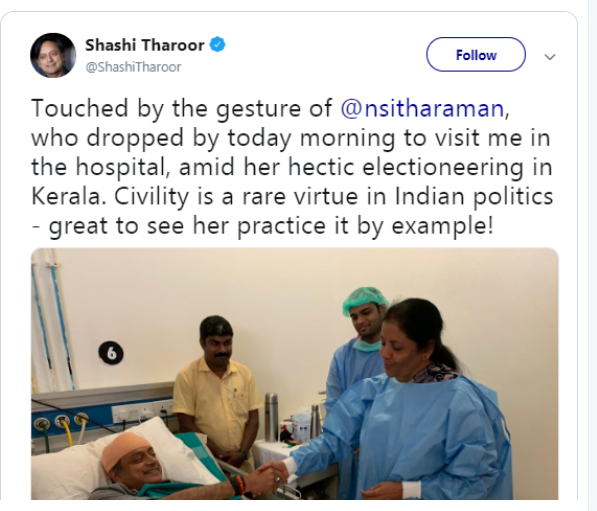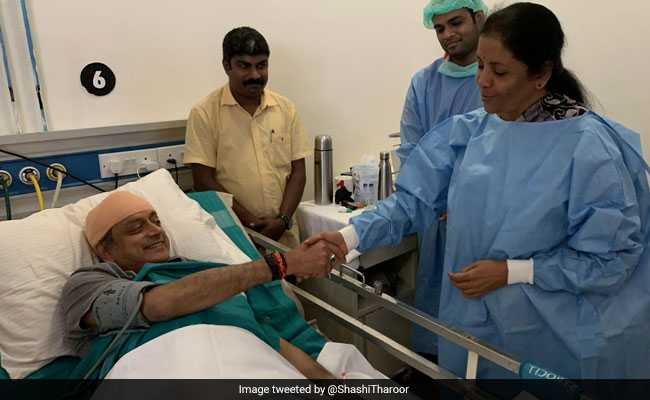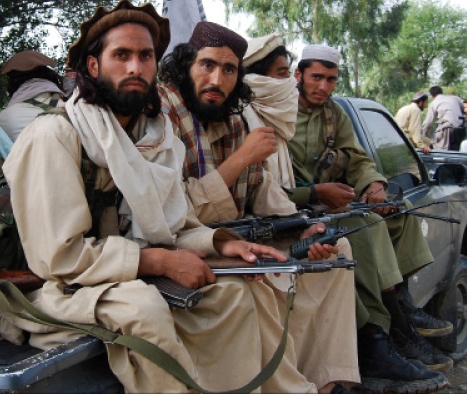We would all perhaps be able to recall that on 15th, April 2019, Congress leader Shashi Tharoor got injured while performing a ritual at a temple in Thiruvananthapuram, in Kerala. Defence Minister Nirmala Sitharaman paid a visit to her political opponent Shashi Tharoor who was hospitalized in Thiruvananthapuram. After her visit, Tharoor tweeted that “Civility is a rare virtue in Indian politics – great to see her practice it by example!” His tweet referred to two things, first, that civility is a rarity in Indian politics and second, that civility is like any other moral virtue that depends on the individual’s discretion. His tweet made me think about the importance of civility in democratic politics and the nature of civility or incivility on display in our political sphere.

The literal meaning of civility refers to the aspect of formal politeness and courtesy in behaviour and speech, which makes it appear like some kind of table rules in Victorian sense. However, the meaning of civility in political philosophy is much broader and it is considered to be a necessary virtue for the proper functioning of a secular democratic polity. Civility as a virtue becomes important when we move from feudal to modern ways of organizing our society and polity. Civility acquires importance in the modern world because it elevates ‘reason’ as the basis of knowledge and ‘common good’ in the secular democratic society. It also refers to a necessary condition for more associational forms of living rather than one which is based on ascribed identities. Civility broadly refers to the attitude of respect, tolerance, and reciprocity among the members of a democratic society, which supersedes differences such as caste, class, religion, gender, and ethnicity.
Civility requires respecting the basic rights of human beings, which makes it a necessary condition for the actualization of citizenship in a democratic nation-state. Civility unlike other moral virtues, which float in the abstract thin air, needs to be actualized in the society for the democratization of the society. Civility is intimately tied with ideas of equality, freedom, justice, and dignity. Civility needs to be made regular, patterned and in certain sense institutionalized in our society. It cannot be a moral act, which depends on the whims and fancies of a particular individual, but civility needs to acquire a generalized and predictable quality in a democratic society. It should not be an exception to the rule like Defence Minister Nirmala Sitaraman visiting opposition leader Shashi Tharoor in the hospital (which Tharoor described as a rare act of civility) but civility should be the ‘rule”.
The western political philosophers in the seventeenth and eighteenth century while discussing the nature of polity and society in the modern world gave immense importance to the inculcation of civility in the society for creating and sustaining a secular democratic polity. Hobbes, Locke, Adam Fergusson, Kant, Hegel and others, all dealt with the question of civility and its importance when a society progressed from feudalism to modernity. Despite their differences in the conceptualization of civility, one common thread, which can be deduced, is that civility requires the respect for basic rights of all. These Rights encompass equality, freedom, justice, and dignity. It requires that ‘common good’ take precedence over individual interests and desires. Civility becomes a necessary condition for the proper functioning of a democratic polity, which saves it from majoritarian tendencies or personal needs and interests being advanced as the ‘general will’ of the society.
India adopted constitutional democracy after independence. Constitution of India bestowed citizenship rights on every adult individual of the country despite differences of caste, class, religion, region, and gender. It was believed that formal equality given by the constitution would erase the inequalities of various kinds prevalent in society. One could argue that, in the Indian case, democracy came much before civility as a generalized mode of behaviour was established in Indian society. There was great hope reposed on constitutional democracy to inculcate civility in the polity and society. Dr. Ambedkar understood the problem of having a democratic setup without generalized civility in society. He argued that political democracy couldn’t succeed without social and economic democracy. Civility was an arena of possibility in a deeply divided Indian society and it was thought that we as a society would learn the rules of the associational form of living where civility becomes a generalized mode of behaviour in our society. However, the experience tells us that our democratic polity has failed miserably in this regard. Just a quick glance at the nature of debate and discussion, and the kind of language being used by our political class would throw ample light into the ‘incivility’ of political discourse in India.
I would point towards the following three dimensions in which “incivility” is on display in Indian politics:
First, the rampant use of ‘unreason’ in our democratic polity is not a new thing but recently the public proclamation of unreason has acquired some sort of legitimacy. What were whispers earlier have become slogans now. Some politicians are arguing that there were pushpak vimaan (aircraft) in Ramayana times; others say that cow dung can absorb harmful radioactive elements. There are hundreds of examples like these, which displays the rampant use of unreason by our political leaders. There is an atmosphere of anti-intellectualism where any critical inquiry could be rubbished in the name of nationalism or by using creative binaries like Hard-work Vs Harvard used by our prime minister. Civility requires prevalence of reason which protects the society from arbitrariness and maintains its secular character. For the collective good of society, ‘reason’ should be given its due place in the secular democratic society. Our constitution recognizes this fact and talks about the inculcation of “scientific temper” in society. Contrary to “scientific temper”, what we see in our polity and society is the display of unreason and unscientific attitude.
Second, the language of our political leaders should reflect the democratic ethos of our constitution; it should not be exclusionary or derogatory to one section of the population or the other. Civility requires that certain kinds of expression have no space in a secular democratic framework. However, what we frequently see is that our political leaders stooping down to the lowest levels to seek votes in the elections. Uttar Pradesh CM Yogi Adityanath during election campaigning said that “Agar Congress ko Ali par, Sapa-Baspa ko Ali par vishwas hai, humein bhi Bajrangbali par vishwas hai”. The communal and exclusionary remarks made by him are symptomatic of the incivility in our political class. The use of derogatory and filthy remarks for one’s political opponent has become a new normal in Indian politics. The language of political discourse in our polity displays its brazen incivility.
Third, civility can only prevail in the absence of fear. Peace and security are a precondition for civility. However, the rise of majoritarianism in India has created an atmosphere of fear in which mob lynching and detention of advocates of human rights has become a new normal. The dominance of money and muscle power in the political arena also refers to the kind of incivility we have been able to actualize in our polity.
Therefore, when someone says that civility is a rarity in Indian politics, it is not a good sign for a secular democratic system. Civility is an essential condition for the sustained functioning of a secular democratic system. Erosion of civility and rampant display of incivility in Indian politics should concern every citizen of this country.
***














